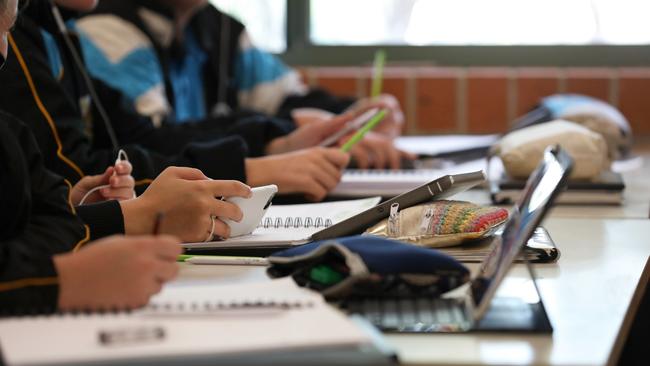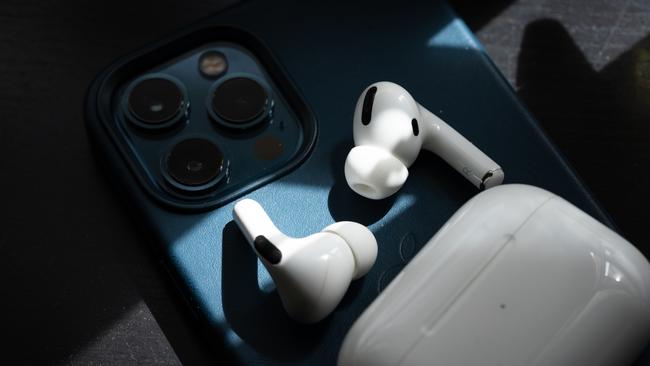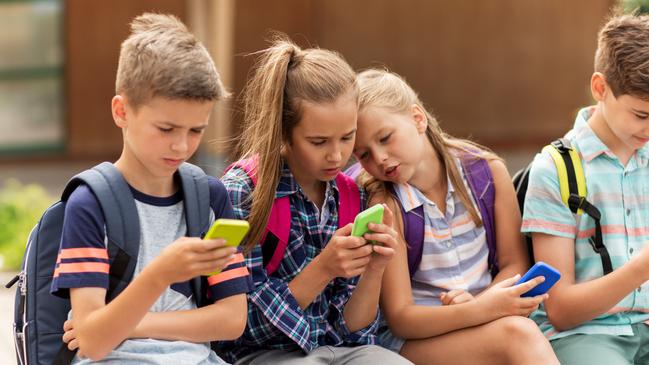Teachers and education experts call for wearable devices to be banned in school phone policy
Teachers and education experts are calling for wearable devices to be included in the Victorian phone ban, as schools take drastic measures to stamp out poor concentration and anti-social behaviour.

Schools Hub
Don't miss out on the headlines from Schools Hub. Followed categories will be added to My News.
Teachers and education experts are calling for wearable devices to be included in the Victorian phone ban, as schools take drastic measures to stamp out poor concentration and anti-social behaviour.
Schools are confiscating wireless headphones such as AirPods, which have become the latest distraction since the implementation of mobile phone bans in 2020.

A teacher who works at an inner-eastern public high school said the devices have become a “huge issue” telling the Herald Sun it was not uncommon for students to be wearing them all day, including through class and break times.
“They’re so easy to hide in the classroom, and even in the schoolyard students will be walking around with (wireless headphones) in – they’re like an accessory,” she said.
“I’ve had to explain to students it’s actually rude and you can’t order coffee or speak to someone with them in or you won’t be served.”
Numerous teachers from a range of public and independent high schools across Melbourne have told the Herald Sun of similar issues taking hold within classrooms and schoolyards.
Despite there being no explicit mention of wireless devices in the mobile phone policy, the Department of Education maintains “earbuds that are connected to a device should not be worn, and their use breaches the policy”.
The current policy does state however that students are able to bring wearable devices to school on the condition they mute all notifications – but when asked the Department did not say whether wireless headphones were considered wearable devices.
Meanwhile non-government schools are able to implement device policies at their own discretion.

Deakin University cyber-psychologist Bianca Klettke called for the devices to be explicitly included in the state school phone ban, as their behavioural impact was “detrimental”.
“The phone ban was initiated so students can focus more on their learning. These devices are a vehicle by which to access the phone and are certainly not conducive to enhancing focus and learning,” Dr Klettke said.
There have been vexed community views about the efficacy of blanket bans on devices in schools among education and parenting bodies.
A NSW government survey released earlier this year showed students were less distracted in the classroom in the year since mobile phones were banned in all public schools.
The study, which surveyed 1000 public school principals, revealed 81 per cent of students experienced improved learning, with the South Australian government reporting a 54 per cent reduction in behavioural issues.
Dr Klettke labelled the evidence “resounding”.
“I don’t see how (bans) can’t be effective, taking a device that is so prominent and not having it in your hand all the time can only help with learning,” she said.
Parents Victoria chief executive Gail McHardy said the organisation flagged the possibility of an increase in “covert use” of devices – like wireless headphones – after the Victorian phone ban took effect in 2020, but maintained responsibility fell upon parents to “educate and monitor their children with appropriate” technology use.
“This should be the highest priority so school staff would not need to rely on the school policies to enforce school rules,” Ms McHardy said.
A Department of Education spokesperson said: “We want all our classrooms and school environments to be conducive to learning and the mobile phone ban supports this by helping remove distractions”.
“Our nation leading mobile phone ban has boosted student engagement, improved social interactions, increased physical activity during breaks and reduced incidents of cyber-bullying during school hours.”




